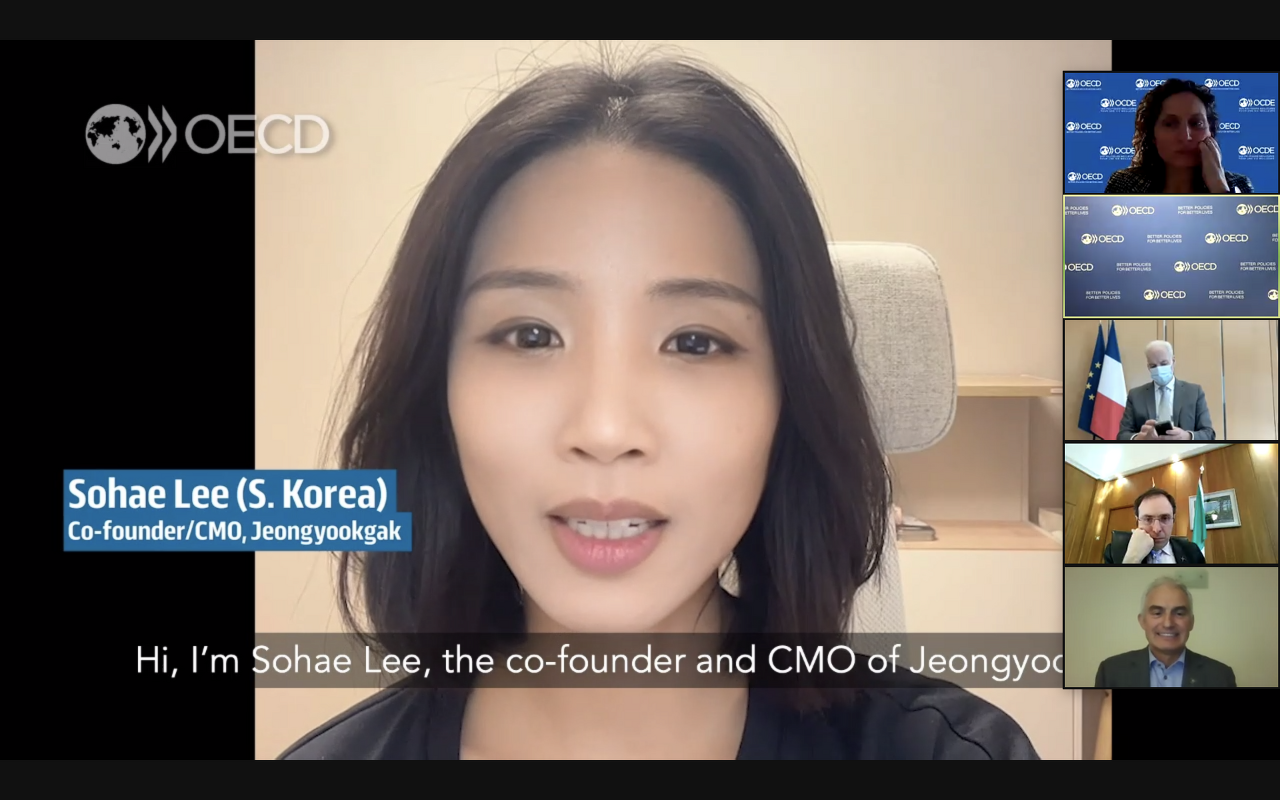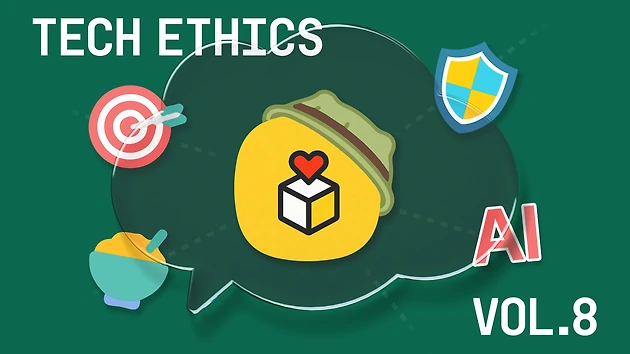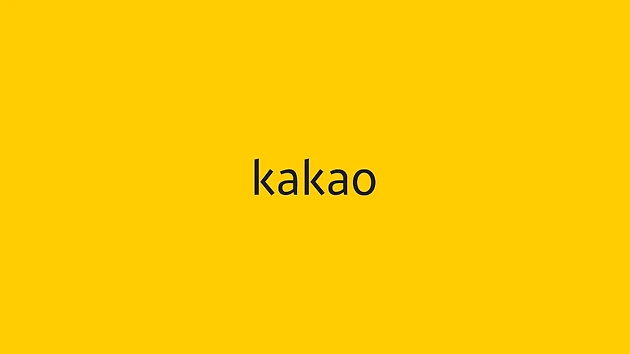Introducing KakaoTalk Wallet and Verification Services to the OECD
The Digital for SMEs Global Initiative (D4SME) was organized by the OECD’s Centre for Entrepreneurship, SMEs, Regions and Cities (CFE) to discuss the digital transformation of SMEs.
D4SME was launched in 2019 as a platform for the world’s governments, large corporations and SMEs to discuss policies and plans that help SMEs keep up with digital trends and furthermore, thrive. The 2020 COVID-19 pandemic has brought on many changes in the business environment, shifting D4SME’s focus to promoting a strong digital presence for SMEs.
Kakao participated in the 2nd Roundtable on the OECD Digital for SMEs Global Initiative (OECD D4SME), which was held on the 3rd and 4th of February 2020, and introduced ‘Kakao Work’ and ‘KakaoTalk Wallet/ID Card’ services as “digital tools to telework efficiently and increase wellbeing”.
Discussions on technology beneficial for telework·wellbeing at the ‘Digital for SME Initiative’
Roundtables are the most pivotal of all events initiated by D4SME. The first roundtable was held at the OECD headquarters in Paris in November 2019. Kakao was invited to the first roundtable to talk about Kakao’s services that contributed to expanding SMEs’ digitalization. More information is provided in the Brunch post about the first roundtable.

Kakao, the only Asian private partner of the OECD D4SME
Kakao participated in the initiative as an official private sector partner for the D4SME. D4SME currently has six private sector partners, including Amazon, Facebook, Microsoft, Vodafone and Wix, with Kakao being the only partner from Asia.

Due to restrictions in mobility between countries, the second OECD Roundtable on D4SME was held online as a web conference. The second roundtable consisted of three dedicated sessions and a closing session.
The three sessions outlined below were held under an umbrella theme, each accommodating 150 people from various governments, businesses and organizations.
Theme: SME Digitalization and Responses to COVID-19
- Session 1: SMEs moving online: Digital presence, e-commerce, digital security risks
- Session 2: SMEs capabilities to access fast and affordable digital infrastructure
- Session 3: Digital tools to telework efficiently and increase wellbeing.
On opening day, the OECD Secretary General, Angel Gurría, emphasized in his opening remarks that access to digital infrastructure and improvements of digital skills were vital for SMEs that were hit hard by the COVID-19 pandemic. He mentioned Denmark, New Zealand, Chile and South Korea as countries with forward-thinking governments that actively digitalized their SMEs.
Stuart Nash, Minister of Small Businesses of New Zealand, chaired the first session and said that D4SME was the only opportunity in the OECD where countries can come together to share opinions on the digitalization of SMEs, and that the importance of this initiative was proven by that fact that D4SME’s private sector partners are all market leaders.

Kakao’s Presentation
In Session 3 of the D4SME Roundtable, Daewon Kim, Director of Kakao’s Policy Team, introduced ‘Kakao Work’ and ‘KakaoTalk Wallet/ID Card’ services as digital tools that assist SMEs’ telework and provide contactless services.
In response to Kakao’s presentation, Minister Stuart Nash, who chaired the third session, said that “New Zealand has recently talked about the security of teleworking tools, as Kakao has just emphasized”. He also stressed that Kakao’s contribution as D4SME’s private sector partner was extremely important.
The following is a transcript of Kakao’s director Daewon Kim’s comment.
Kakao’s comprehensive work platform Kakao Work provides increased access to SMEs, and although Kakao Work is a free service, it applies the strongest security technology (E3) available.
Kakao, Korea’s leading internet corporation, offers a wide variety of B2C and B2B platforms. Despite the difficulties imposed by COVID-19, we hope that Kakao’s digital tools will be used for our users’ work purposes and throughout their daily lives.
Most SMEs experienced difficulties when abruptly transitioning to remote work due to COVID-19. Daily communication services such as KakaoTalk can be used for telework, but SMEs still need affordable and effective digital tools that are specialized for the SME’s specific business in order to implement and sustain a seamless telework environment.
Digital tools designed for telework can be used for simple communication, as well as for organization management, electronic approvals and attendance management. SMEs might have difficulties procuring and applying individual solutions needed to complete each task. Kakao Work, Kakao’s work platform, offers comprehensive work solutions as well as an AI assistant. Many Kakao Work functions are free, providing more access to SMEs.
However, there’s one thing teleworking tools cannot compromise, and that’s “security”. Most SMEs can’t spend large amounts of money purchasing telework tools with powerful security technology. While Kakao Work is offered free of charge, it also includes the strongest security technology (E3: Enterprise Endpoint Encryption) available.
SMEs can expect more efficient contactless transactions and higher customer retention using Kakao’s easy-to-use and credible identity verification services
Kakao is currently focusing on simplifying identity verification. With the increase in contactless monetary and service transactions, there is an increased need for businesses and consumers to verify each other’s identity or credentials.
Kakao recently launched an “identity verification” service that easily verifies authorized status or credentials. The service offers increased accessibility, allowing users to take out their IDs as if they were taking it out of their wallets. Kakao’s easy-to-use and credible identity verification service will assist SMEs when making contactless transaction and help improve customer retention.
Kakao’s business partner ‘Jeongyookgak’, was invited to share insight into its successful digital operations
Jeongyookgak’s co-founder and director Sohae Lee (CMO) spoke at the second session and shared her successful digital experience using Kakao’s business services. The following is a transcript of the full presentation.

Compared to other platforms, Kakao is able to reach potential customers through accurate targeting.
Kakao platforms can be used to successfully respond to changing demands.
Jeongyookgak is a D2C (Direct to Consumer) service that produces and sells fresh meat by utilizing cutting-edge technology to vertically integrate supply change management, production, distribution, sales and delivery.
Beginning in the first half of 2020, as COVID-19 forced people to limit their offline activities, more and more consumers started to purchase meat online instead of buying it at their nearby megastore or local butcher store. Jeongyookgak’s marketing goal was to secure a large number of new customers by reaching as many customer as accurately and efficiently as possible, all while using a reasonable amount of money.
During this process, Jeongyookgak was able to use Korea’s most popular messenger service KakaoTalk to reach a large number of potential customers and achieve our marketing goals.
Kakao’s messenger service is used by everyone in Korea, which, compared to other platforms, made it possible to sample a larger number of people and accurately target more potential customers. After customers are reached through ads, the seller is able to continue communicating with customers through messages sent through KakaoTalk Channel’s brand contents, increasing the possibility of transitioning them into buying customers.
As Jeongyookgak’s example shows, due to changes in user behavior which were brought on by COVID-19, large platforms play a more important role in connecting suppliers and consumers. Meat, which was previously not thought of as a product that could be purchased online, has recently seen a boost in online sales. Jeongyookgak used IT for vertical integration for operations and has successfully responded to changes in demand using Kakao’s platform as leverage.
We at Jeongyookgak also developed our own delivery system called ‘Jeongyookgak Runs’ to deliver the increased volume of orders in a stable manner. We used crowdsourcing to recruit delivery people. Once again, KakaoTalk ads and messages proved to be the most effective tool when hiring new people.
Meanwhile, most SMEs are not prepared for the changes in demand (mainly shifting to the online space) that arose due to COVID-19, and need assistance in parts of the entire value chain that they can’t handle themselves. For example, a business that made and sold products offline needs more than an online shopping mall to go online. These SMEs need to be able to process orders and handle distribution, which is why they need the help of companies that operate fulfilment services.
Digital literacy of SMEs are lower than you think, so SMEs need more support in areas they don’t consider to be vital and therefore don’t usually focus on. If these areas are not put into consideration, the disparities between SMEs in terms of capital, digital competency and time will only deepen, and most SMEs, with a small number of SMEs as an exception, will meet their demise.
Another good example is that the delivery-oriented market is more favorable to younger entrepreneurs with digital literacy. Many traditional eateries that were not passed along to the next generation have actually closed their doors, while those that quickly adjusted to the new environment launched easy-to-use home meal kits, which led to an explosive increase in sales.
These problems cannot be solved by large IT companies that lack domain knowledge. A good solution would be to build partnerships with other SMEs like Jeongyookgak, which has both domain knowledge and IT capacities. Jeongyookgak is currently drawing blueprints of a D2C service for fresh produce.
- Tech Ethics Discover New Tastes With
“AI Gift Explorer” #kakaotalk#GiftService#AIRecommendations#CustomerPreferences#Safe
#kakaotalk#GiftService#AIRecommendations#CustomerPreferences#Safe - Press Release 발행일 2025.08.07 Kakao Reports Record-High Q2 2025 Revenue of ₩2,028.3B and Operating Profit of ₩185.9B
 #kakao#Q2 2025
#kakao#Q2 2025


